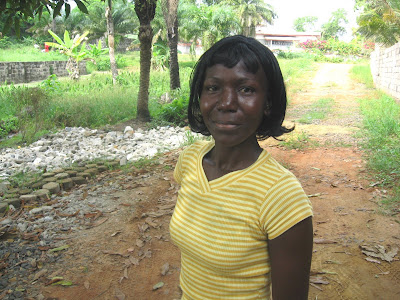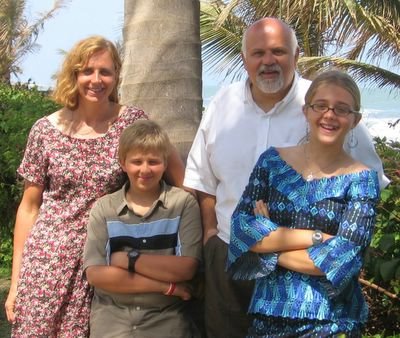Weather: Harmattan visited us for less than a week, with morning temps as low as 64F, a relatively low humidities. We were caressed with perfect weather for about four heavenly days. Alas, all that is over. Temps and dew points are back up with highs in the mid 90s and humid, and outside morning lows are back in the 70s. Morning lows in our house, low 80s.
It is not unusual for Renita or me to get inquiries regarding our work in Liberia. Every week, a curious web surfer stumbles across our blog and contacts us with questions. It is familiar, and really, everybody gets these “So tell me more about your work” requests. Usually, after receiving the information, they say something nice about us and go on with their business. Every once and a while though, we get something like this, “What difference do you think you are making in people’s lives?”
It’s a good question.
To be perfectly candid, I wonder sometimes what difference we make. Not about everything, like I know helping build the Foster Town Market directly impacts a lot of people, but some things I wonder about. For instance, I wonder about the many workshops that Renita and I do. We average a couple hundred hours of workshops every year. We speak before Liberians in rural settings and in schools, in churches and in palaver huts. We discuss topics ranging from “how to manage your microbusiness,” to “resolving conflict in your village” to “Christian leadership.” Is it reasonable to think most of the participants—or even a few—will be changed by what we offer? After spending a few hours together, is it reasonable to expect what we say will even be remembered? Are we wasting our breath if few remember?
Last Friday I sat in the conference room at the Ministry of Health and Social Welfare. There were a few of us from various organizations and from the Ministry. We were discussing the fact that mental health is low on the government budget priorities. For the umpteenth time. It seems that as the country emerges from its devastation, focus remains on the most serious, most visible damage: roads, infrastructure, and in the health arena, on medical conditions like malaria and HIV. Mental health is difficult to address, or maybe to even think about. So for two and a half years, I’ve faithfully attended most of the Ministry’s “Mental Health Task Force” meetings. I may have attended more meetings than anyone. I’ve offered input, helped with studies, written reports, and conducted a national reporting workshop. And there I was Friday, after two and a half years, listening to some new Ministry guy telling us how important our voice is, that we must continue our advocacy of mental health programming, that the country cannot recover without it.
Blah blah blah.
I thought, “Who are we kidding? Nobody has listened to our advocacy yet, what makes us think anybody will start now? The country is not ready to address its huge mental health needs. We are not making any difference.” I decided I would speak up and say just that. So, in a lull in the conversation, I started to speak. The acting chair person’s phone rang (and in Liberia, phones are almost always allowed to interrupt whatever is going on.). I waited. After the call, we got diverted. Another lull came. I started to speak. The conference door opened, and a latecomer arrived and had to be brought up to speed. Then another diversion. Then another lull, and for the third time I started to speak, only to be interrupted again. I realized that maybe Somebody wanted me to keep my cynical mouth shut. I realized I was being told to take a step back.
I took a step back in my mind, and with a new inner perspective came a new thought. Maybe we are just one part of a process. Maybe we are supposed to be advocating regardless of who's listening, giving workshops that may be forgotten, supposed to be banging our heads against the wall. After all, if you bang your head long enough, the wall gives way. Maybe someday the country will be ready for prioritizing mental health, and then they just might listen to our advocacy, even if we are long gone.
Then in my mind I took another step back, and it hit me that whatever we do, whether we see immediate results—like building a market—or nothing at all, we are everywhere part of a process, like cogs in a giant machine. Or not like cogs, because we are not that important. Maybe we are like grease helping cogs run well. We do our part, get used up, get replaced, but in time our sacrifice, and the sacrifice of those before and after us, pays off. In the end, only the Master Machinist knows the how and where we changed things for the better. I guess in the end, it doesn’t necessarily matter that we see what difference our being used made. In the end, I think it matters mostly that we can say we were available for use and got used doing what we were made to do.
The difference comes in being available.
It is not unusual for Renita or me to get inquiries regarding our work in Liberia. Every week, a curious web surfer stumbles across our blog and contacts us with questions. It is familiar, and really, everybody gets these “So tell me more about your work” requests. Usually, after receiving the information, they say something nice about us and go on with their business. Every once and a while though, we get something like this, “What difference do you think you are making in people’s lives?”
It’s a good question.
To be perfectly candid, I wonder sometimes what difference we make. Not about everything, like I know helping build the Foster Town Market directly impacts a lot of people, but some things I wonder about. For instance, I wonder about the many workshops that Renita and I do. We average a couple hundred hours of workshops every year. We speak before Liberians in rural settings and in schools, in churches and in palaver huts. We discuss topics ranging from “how to manage your microbusiness,” to “resolving conflict in your village” to “Christian leadership.” Is it reasonable to think most of the participants—or even a few—will be changed by what we offer? After spending a few hours together, is it reasonable to expect what we say will even be remembered? Are we wasting our breath if few remember?
Last Friday I sat in the conference room at the Ministry of Health and Social Welfare. There were a few of us from various organizations and from the Ministry. We were discussing the fact that mental health is low on the government budget priorities. For the umpteenth time. It seems that as the country emerges from its devastation, focus remains on the most serious, most visible damage: roads, infrastructure, and in the health arena, on medical conditions like malaria and HIV. Mental health is difficult to address, or maybe to even think about. So for two and a half years, I’ve faithfully attended most of the Ministry’s “Mental Health Task Force” meetings. I may have attended more meetings than anyone. I’ve offered input, helped with studies, written reports, and conducted a national reporting workshop. And there I was Friday, after two and a half years, listening to some new Ministry guy telling us how important our voice is, that we must continue our advocacy of mental health programming, that the country cannot recover without it.
Blah blah blah.
I thought, “Who are we kidding? Nobody has listened to our advocacy yet, what makes us think anybody will start now? The country is not ready to address its huge mental health needs. We are not making any difference.” I decided I would speak up and say just that. So, in a lull in the conversation, I started to speak. The acting chair person’s phone rang (and in Liberia, phones are almost always allowed to interrupt whatever is going on.). I waited. After the call, we got diverted. Another lull came. I started to speak. The conference door opened, and a latecomer arrived and had to be brought up to speed. Then another diversion. Then another lull, and for the third time I started to speak, only to be interrupted again. I realized that maybe Somebody wanted me to keep my cynical mouth shut. I realized I was being told to take a step back.
I took a step back in my mind, and with a new inner perspective came a new thought. Maybe we are just one part of a process. Maybe we are supposed to be advocating regardless of who's listening, giving workshops that may be forgotten, supposed to be banging our heads against the wall. After all, if you bang your head long enough, the wall gives way. Maybe someday the country will be ready for prioritizing mental health, and then they just might listen to our advocacy, even if we are long gone.
Then in my mind I took another step back, and it hit me that whatever we do, whether we see immediate results—like building a market—or nothing at all, we are everywhere part of a process, like cogs in a giant machine. Or not like cogs, because we are not that important. Maybe we are like grease helping cogs run well. We do our part, get used up, get replaced, but in time our sacrifice, and the sacrifice of those before and after us, pays off. In the end, only the Master Machinist knows the how and where we changed things for the better. I guess in the end, it doesn’t necessarily matter that we see what difference our being used made. In the end, I think it matters mostly that we can say we were available for use and got used doing what we were made to do.
The difference comes in being available.

A couple available people in our lives. Trokon, here 2o feet up trimming the lower branches of one of our two coconut trees. The 12 year old climbs without a ladder and wields the cutlass like a pro. Insert shows him up close in the tree.

Sis' Vera-- available to us every weekday, making shopping, laundry and cooking much easier for the Reeds in Liberia.

